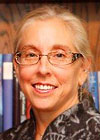
On March 4, Hilary Kahn, assistant dean for strategic collaborations and director of the Center for the Study of Global Change in the School of Global and International Studies at Indiana University, will join two fellows from the “Framing the Global” project for a Faculty Conversation exploring how “going global” can enhance disciplinary approaches and regional studies.
To help kick off the conversation, NAFSA asked Kahn a few questions about the origin of the “Framing the Global” project and what members of NAFSA’s global learning community can learn from this collaborative online conversation.
What prompted the creation of the "Framing the Global" project?
“Framing the Global” emerged from my own difficulties in finding an appropriate approach for an interdisciplinary course in global studies I was teaching as part of the PhD minor in global studies at Indiana University. It became apparently clear that the field of global studies needed an analytical framework that was flexible enough for all the different questions scholars of all ages were asking from a variety of professional and disciplinary angles.
For those not familiar with the “Framing the Global” book and project, what do you hope participants will gain from the event?
I would hope that the participants will learn a bit more about what is a grounded and critical approach to global studies research and how this framework is transferrable to a number of pedagogical and institutional contexts.
The various essays in the book show how students can incorporate global studies through a variety of subjects and research. How will this event help educators provide new ways for students to start that process?
The event will outline the basic “Framing the Global” concepts and demonstrate how they can become a means of creating deliberate global learning communities in classrooms and on campuses. Educators will hear how members of “Framing the Global” have utilized this approach in research and in curriculum development, teaching, and internationalization. They will also learn the importance of the process of interdisciplinary and collective knowledge production, and how collaborative learning environments are at the core of what a global classroom should be in the twenty-first century.
How can educators start to “go global” in their own teaching or curriculum?
Good question. There are many ways to answer this, which we will cover in the event. One thing that immediately comes to mind is that educators must first recognize that “going global” and going “interdisciplinary” strengthens disciplinary and more localized approaches. Educators must also be willing to rethink what is a classroom and to share the production and dissemination of knowledge.
